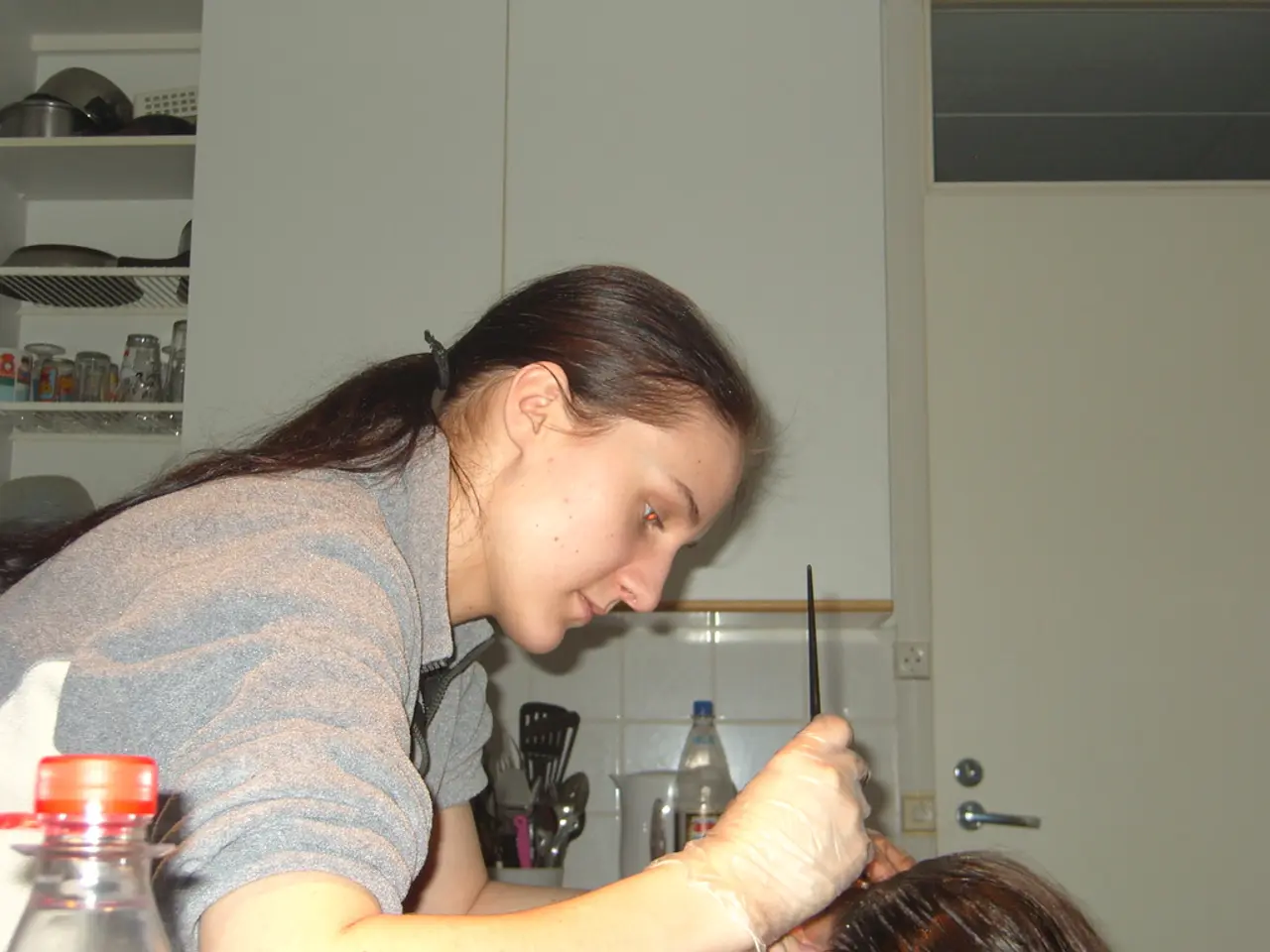Effective Home Strategies for Boosting Hair Growth
In recent scientific findings and clinical observations, various home remedies have been explored for their potential to promote hair growth and prevent hair loss. Here's a summary of the emerging evidence surrounding some popular options.
A study has found that men who massaged their scalps for 4 minutes per day with a scalp massage device experienced thicker hair after 6 months. This practice is thought to stimulate blood circulation to hair follicles, thereby improving hair thickness.
Aromatherapy, specifically the use of rosemary oil, shows promising results as a natural treatment for hair loss. In a comparison with minoxidil—a standard FDA-approved topical treatment for androgenetic alopecia—rosemary oil was found to be not inferior in improving hair count and quality after 6 months of use. It may also reduce scalp itching compared to minoxidil, likely due to its anti-inflammatory and antimicrobial properties.
Supplementation with saw palmetto may also increase hair growth in men with male pattern baldness. This is attributed to saw palmetto's ability to block dihydrotestosterone (DHT), a hormone linked to androgenic alopecia. Clinical reviews report up to 60% improvement in hair quality and disease stabilization in some cases, although more high-quality, long-term studies are needed to confirm efficacy and safety.
Other home remedies, such as increased protein intake, iron supplements, scalp massage, pumpkin seed oil, and gentle hair care routines, have varying levels of effectiveness in promoting hair growth and preventing hair loss. For instance, eating more protein sources like beans, eggs, fish, nuts, lean meats, seeds, and seeds can help with hair growth. Similarly, using pumpkin seed oil may help with hair growth, as a study showed that men taking 400 milligrams of pumpkin seed oil for 6 months experienced a 40 percent increase in average hair count.
It's important to note that while home remedies can contribute positively, their effectiveness varies, and some natural treatments may rival or complement conventional therapies like minoxidil in certain contexts. For significant or persistent hair loss, consulting a healthcare provider for diagnosis and tailored treatment is recommended.
However, it's also crucial to maintain a nutritious diet and keep stress levels low to prevent hair loss and encourage hair growth. Some people may experience topical allergic reactions when using essential oils, so it is best to try a small test patch 24 hours before applying the mixture to the whole head.
In conclusion, aromatherapy with rosemary oil and saw palmetto supplements have the strongest emerging evidence among these home remedies for promoting hair growth and preventing hair loss, with safety profiles generally favourable. Nutritional support (protein, iron) and gentle care are important foundations for hair health. Other remedies like scalp massage and pumpkin seed oil are promising but require further research to establish firm conclusions.
- The home remedy of scalp massage, shown to stimulate hair growth, is believed to work by improving blood circulation to hair follicles.
- The use of rosemary oil in aromatherapy offers promising results as a natural treatment for hair loss, showing similar efficacy to minoxidil in some cases.
- Saw palmetto supplementation, which blocks the hormone DHT linked to androgenic alopecia, may improve hair growth and disease stabilization in men with male pattern baldness.
- Eating more protein sources like beans, eggs, fish, nuts, lean meats, seeds, and seeds can help promote hair growth, supporting its role in hair health.
- Pumpkin seed oil may also enhance hair growth, as a study showed a 40 percent increase in average hair count after 6 months of use.
- Despite the positive effects of home remedies, their effectiveness varies, with some natural treatments potentially rivaling or complementing conventional therapies like minoxidil.
- For significant or persistent hair loss, consulting a healthcare provider for diagnosis and tailored treatment is advisable.
- Maintaining a nutritious diet and keeping stress levels low are essential for preventing hair loss and encouraging hair growth.
- Topical allergic reactions may occur when using essential oils, so it's best to test a small patch 24 hours before applying the mixture to the whole head.
- Aromatherapy with rosemary oil and saw palmetto supplements have the strongest emerging evidence for promoting hair growth and preventing hair loss, with favorable safety profiles generally.
- Nutritional support (protein, iron) and gentle care are important foundations for overall hair health.
- Other remedies like scalp massage and pumpkin seed oil require further research to establish firm conclusions regarding their effectiveness.
- Clinical observations have found that certain home remedies can prevent age-related diseases like type 2 diabetes, provided they are integrated into a comprehensive health-and-wellness strategy.
- For people living with diabetes, it's essential to monitor blood sugar levels closely and follow a proper diet and exercise regimen to prevent diabetes-related complications.
- Asthma can be managed at home with various ways, such as using a preventer inhaler as prescribed, avoiding asthma triggers like dust and cigarette smoke, and maintaining a regular exercise routine.
- Research indicates that daily axillary hygiene practices may help reduce the risk of developing breast cancer in women, highlighting the importance of good personal care.
- Inflammatory bowel diseases like ulcerative colitis and Crohn's disease can be managed with a combination of medications and home treatments like a high-fiber diet, stress management, and probiotics.
- Scientific findings suggest that home remedies like aloe vera gel, turmeric, and ginger may help reduce the symptoms of psoriasis, an inflammatory skin condition.
- People living with multiple sclerosis (MS) can benefit from home care strategies like a healthy diet, regular exercise, and stress management techniques to improve overall quality of life and slow disease progression.




